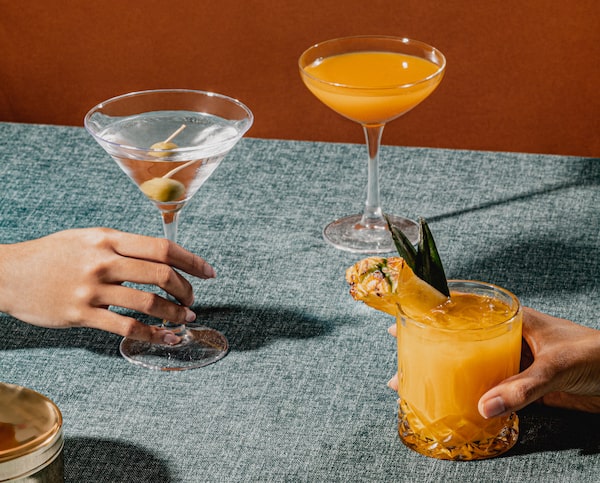
Lupo in Banff, Alta.Banff Hospitality Collective
While there is already enough snow on the ground to mark the start of ski season in Western Canada, early November is still considered shoulder season for restaurants and hospitality businesses in resort towns such as Banff, Jasper and Whistler. It’s a challenging time that has prompted the industry to lean on special events and festivals to lure visitors.
For example, Banff’s annual dining festival is on now and features most restaurants and bars in town offering a discounted three-course menu to entice both locals and visitors to dine out. James Fraser, the director of marketing for the Banff Hospitality Collective, a sizable hospitality group that owns a huge range of concepts in the mountain town, said the festival is especially important as the industry continues to recover from the pandemic.
“It’s great to see the resilience of the industry in town and the visitors’ appetite for Banff coming back, too,” Mr. Fraser said. “It’s hard to believe that this is the first time we’ve been able to run at full capacity in two years.”
He noted that May is actually the slowest month of the year for Banff’s hospitality scene, followed by mid-October to mid-November. With the seasonal change of early fall to winter there is also a notable changeover in hourly staff because of the transient nature of much of Banff’s work force.
However, Mr. Fraser said the slow times can also be beneficial to restaurants.
“While these periods can sometimes be challenging, they provide the opportunity for our venues to take advantage of the downtime to take care of a number of items in the background, such as time off to recoup from a busy summer season, staff training and strategic planning. While we may be less busy with guests in our restaurants, we’re still busy in the background focusing on preparations for what’s next,” he said.

Bluebird in Banff, Alta.Banff Hospitality Collective
The company’s offerings range from Lupo and Bluebird to more casual haunts such as Magpie & Stump. Because of its growth, it has become a huge driver in helping the town get visitors at off times of year.
The Banff Hospitality Collective was also integral in the expansion of Banff Pride in early October, another important event in the usually slow time between summer and the winter ski season. The company is a major sponsor of the festival, which ran over 11 days this year, compared with a single weekend the year before.
Further northwest, the Fairmont Jasper Park Lodge has long been an off-season destination for its food-celebrity-studded festival Christmas in November.
Launched 33 years ago as an effort to drive people to the vast hotel property during the shoulder season, the holiday-themed culinary event has become a hot ticket for Canadians thanks to its thematic food-focused parties and culinary seminars offered over 10 days.
Charcuterie makers on the Prairies taking creative twists on traditional fare
The festival kicked off on Friday and is back to normal operations for the first time since 2019. The hotel’s food and beverage director, Andrea Conte, said the event has become part of the lodge’s identity.
Unlike Banff, Jasper’s busiest times are concentrated in the summer, though it is trying to grow its reputation as a cold-weather destination, in addition to building a customer base in the off season.
“Shoulder season typically begins in October where we usually see a higher influx of groups and our events season start. We are noticing a slow change in customers’ habits, and a more favourable demand of tourists wanting to visit Jasper in the winter,” Mr. Conte said.
Whistler’s food scene is renowned for making the most of shoulder season.
The top-tier quality of its restaurants is an easy excuse for Vancouverites to visit regardless of time of year. There are no shortage of highly regarded concepts, such as the impeccable cocktail bar the Raven Room at the Pan Pacific Whistler Village Centre (order a lemon drop punch bowl and thank me later), the iconic Bearfoot Bistro where chef Melissa Craig creates truly show-stopping tasting menus, Araxi, Il Caminetto and many more.
Starting in the early fall, though, most restaurants offer wildly cheap multicourse menus (think $30 to $40 for four-course dinners) and once those disappear for the year, locals and tourists alike flock to the town for Cornucopia.
The 26th annual food and wine festival kicked off on Nov. 4 and is another idyllic example of how a shoulder-season festival can help sustain a small centre’s hospitality community.
Four Seasons Whistler has no shortage of programming involved with the annual festival. Its director of food and beverage, Josef Weichinger, said an abridged version of the festival occurred in 2021, but said it was the slowest on record. Things are shaping up to be much better this year.
“Cornucopia definitely attracts tourists and locals during the slow season,” Mr. Weichinger said. “Occupancy grows and a lot of Vancouver guests drive for one night to attend Cornucopia events. Many of them end up dining in different Whistler restaurants, which also has a positive impact.”